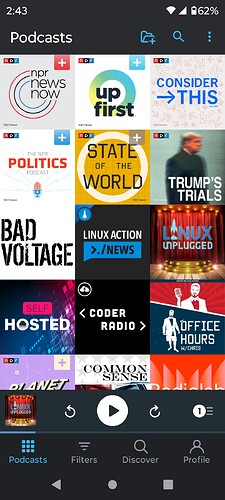Jeremy Garcia, Jono Bacon, and Stuart Langridge present Bad Voltage, in which we do a bit of a deep dive into the (semi-)recent trend of finding new ways for creators to get paid. Patreon’s been around for a long time (but could be doing better), and the idea of making a thing and getting paid for the thing has been around for considerably longer, but it’s a relatively new innovation for platforms to encourage payments and share revenue with creators. Or is it? Is this actually new? Is this what was there already but in a superficially different outfit? And… will it work?
open collective https://opencollective.com/ interesting alternative to github sponsors with what I think is a better approach to the team vs individual problem and the aim to provide some of the solutions to the issues of needing some kind of legal entity for handing the funds. I support the Logseq project there (my note taking app of choice).
I’m also a listener of Jupiter broadcasting that linux podcasting network that’s using bitcoin lightning payments as a part of ‘podcasting 2.0’ see https://podcastindex.org/. If you ignore the crypo bullshit nature of ‘value-for-value’ for a moment it’s got some interesting properties because it actually kind of resembles functional micro payments at the moment. lightning appears to at least partially mitigate bitcoin’s transaction fee issues - not sure how that will play out long term, but for now though it appears you can make extremely granular transactions in this network.
The technical implementation for a ‘content creator’ is dead easy, stick a wallet address in an XML tag in your podcast RSS feed and your basically done. If you want to get fancy you can add ‘splits’ where you have multiple addresses with a specified proportion of the ‘value’ goes to each wallet. If you want to get fancier still you can set splits by time window so that if for example you wanted to ‘pay’ the artist who produced the background music you could add them to a split only while it’s playing. It also has it’s analog of ‘superchats’: ‘boostagrams’ which send text along with the ‘value’ and also respect the ‘splits’
(as an aside another take on this I’ve enountered is ‘merch messages’ from Linus tech tips where people can leave message when they checkout a cart on linus’ merch store while they are livestreaming)
Something that let you do this with ‘fiat’ would be quite interesting but it just doesn’t work with the way payment processing is currently handled because of the outlandishly high transaction fees and the minimum unit of transaction.
If nothing else it’s been nice to see the XML namespace for podcasts get some love after all these years and become more of a community driven standard than just something apple ignored for the last decade or so.
Something that’s not really being addressed is the perpetual growth almost all these companies are built around. Getting people to pay for a service is never enough - they need to be paying more, the content needs to be monetised more, etc… Enshittification.
I don’t want to be part of validating yet another perpetual growth business model.
You mentioned that you hadn’t heard podcasters monetizing - ohh, yes they are - and it’s crypto-nonsense too - It seems to be the ‘new hotness’ as lots of podcasts are finding it difficult to sell add. Here’s another link to more information - Value for Value Podcaster Guide - Value for Value Podcaster Guide (getalby.com) I don’t own crypo and don’t want it - Chris at Jupiter Broadcasting ( Jupiter Broadcasting) is VERY into it and defends it vigerously at every opportunity. I can see why (to some extent) as it’s a way for him to make a living as a podcaster in a time when his regular source of revenue seems to be drying up. Anyway, thought I’d mention it as it fit in with the conversation you were having in the last episode.
Every podcast on that list, save Bad Voltage is paid for. The NPR podcasts are through https://plus.npr.org/; the Jupiter Broadcasting podcasts are through a combination of subscription and gasp crypto. Dan Carlin gets a bit through Patreon.
And despite Jono’s perpetual badmouthing of “crypto-bullshit”; transmitting some Satoshis to a podcaster or musician is the best way to get most of the money to them (the total fees from cash on my end to cash on the other end are <3%), and it’s become trivially easy to do so.


